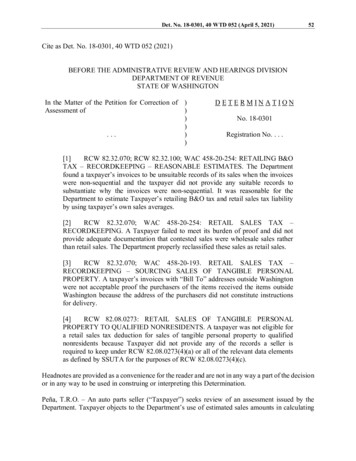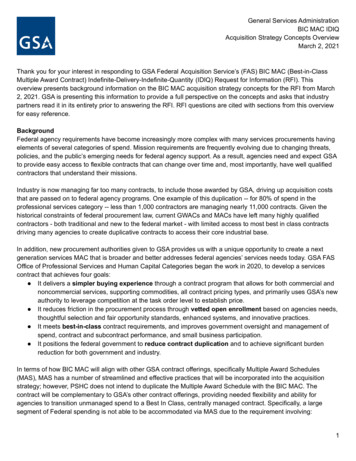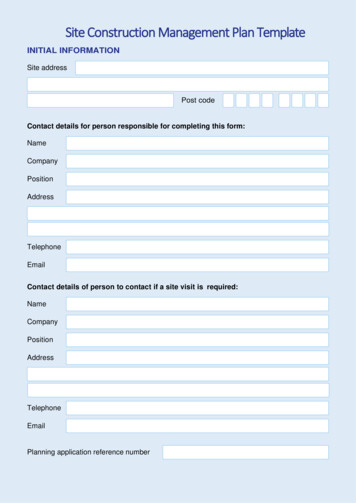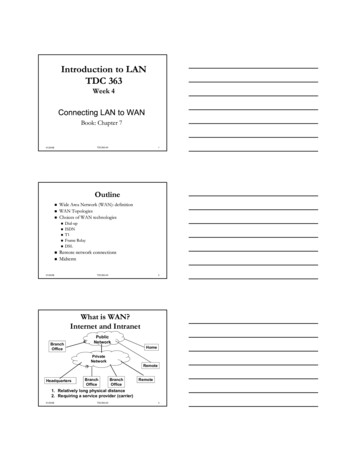
Transcription
Det. No. 18-0301, 40 WTD 052 (April 5, 2021)52Cite as Det. No. 18-0301, 40 WTD 052 (2021)BEFORE THE ADMINISTRATIVE REVIEW AND HEARINGS DIVISIONDEPARTMENT OF REVENUESTATE OF WASHINGTONIn the Matter of the Petition for Correction of )Assessment of))).))DETERMINATIONNo. 18-0301Registration No. . . .[1]RCW 82.32.070; RCW 82.32.100; WAC 458-20-254: RETAILING B&OTAX – RECORDKEEPING – REASONABLE ESTIMATES. The Departmentfound a taxpayer’s invoices to be unsuitable records of its sales when the invoiceswere non-sequential and the taxpayer did not provide any suitable records tosubstantiate why the invoices were non-sequential. It was reasonable for theDepartment to estimate Taxpayer’s retailing B&O tax and retail sales tax liabilityby using taxpayer’s own sales averages.[2]RCW 82.32.070; WAC 458-20-254: RETAIL SALES TAX –RECORDKEEPING. A Taxpayer failed to meet its burden of proof and did notprovide adequate documentation that contested sales were wholesale sales ratherthan retail sales. The Department properly reclassified these sales as retail sales.[3]RCW 82.32.070; WAC 458-20-193. RETAIL SALES TAX –RECORDKEEPING – SOURCING SALES OF TANGIBLE PERSONALPROPERTY. A taxpayer’s invoices with “Bill To” addresses outside Washingtonwere not acceptable proof the purchasers of the items received the items outsideWashington because the address of the purchasers did not constitute instructionsfor delivery.[4]RCW 82.08.0273: RETAIL SALES OF TANGIBLE PERSONALPROPERTY TO QUALIFIED NONRESIDENTS. A taxpayer was not eligible fora retail sales tax deduction for sales of tangible personal property to qualifiednonresidents because Taxpayer did not provide any of the records a seller isrequired to keep under RCW 82.08.0273(4)(a) or all of the relevant data elementsas defined by SSUTA for the purposes of RCW 82.08.0273(4)(c).Headnotes are provided as a convenience for the reader and are not in any way a part of the decisionor in any way to be used in construing or interpreting this Determination.Peña, T.R.O. – An auto parts seller (“Taxpayer”) seeks review of an assessment issued by theDepartment. Taxpayer objects to the Department’s use of estimated sales amounts in calculating
Det. No. 18-0301, 40 WTD 052 (April 5, 2021)53Taxpayer’s tax liability. Taxpayer also objects to the Department’s reclassification of income fromthe Wholesaling Business and Occupation (“B&O”) Tax Classification to the Retailing B&O TaxClassification and retail sales tax, as well as the Department’s denial of tax exemptions for salesoutside of Washington. We grant the petition in part, deny in part, and remand for adjustment tothe tax assessment. 1ISSUES1. Whether the Department reasonably estimated the amounts used to determine Taxpayer’s retailsales tax and retailing B&O tax liabilities under RCW 82.32.070, RCW 82.32.100 and WAC458-20-254 (“Rule 254”).2. Whether Taxpayer maintained adequate documentation to prove its sales were not subject toretail sales tax under RCW 82.04.070 and Rule 254.3. Whether Taxpayer provided sufficient records under RCW 82.32.070 and WAC 458-20-193(“Rule 193”) to show that certain sales are sourced outside of Washington under RCW82.32.730 and exempt from tax.4. Whether Taxpayer provided sufficient records under RCW 82.08.0273 to qualify for adeduction for sales of tangible personal property to qualifying nonresidents for use outside thestate.FINDINGS OF FACTTaxpayer is an automotive shop located in . . . Washington. The Department’s Audit Division(“Audit”) audited Taxpayer’s business records for the period of January 1, 2013, through March31, 2017. Taxpayer filed excise tax returns for all months of the audit period except for the periodof December 1, 2016, through February 28, 2017.Taxpayer provided Audit with paper invoices that numbered 306 to 1001. Audit reviewed all ofthe invoices provided but only retained scanned electronic copies of some of the invoices. Thesales invoices numbering system, however, had large gaps with 200 missing invoices. Taxpayeralso provided 13 invoices with four digit numbers that do not correspond to the main sequence ofinvoices. In addition to reviewing the paper invoices, Audit requested that Taxpayer provide acopy of its electronic records, specifically its QuickBooks backup file. However, there isdisagreement between Audit and Taxpayer on the extent to which Taxpayer kept electronicrecords. Audit asserts Taxpayer used QuickBooks to at least some extent and told Audit that itsQuickBooks files are not one hundred percent accurate because it does not apply all payments toQuickBooks. Taxpayer asserts it told Audit, “The records were manually created but the invoiceswere printed out using a computer and a program ‘something like’ QuickBooks, but that the official1Identifying details regarding the taxpayer and the assessment have been redacted pursuant to RCW 82.32.410.
Det. No. 18-0301, 40 WTD 052 (April 5, 2021)54business records of [Taxpayer] are all paper hard copy.” Reply to Audit’s Response to Petitionat 1.Audit determined it did not have sufficient records to determine if the missing invoices between306 and 1001 were estimates, payments not received, or invoice numbers not being used. As aresult, Audit estimated Taxpayer’s income on the missing invoices. It did so by assigning anaverage amount to each missing invoice based on the total retailing income of the invoicesTaxpayer provided, divided by the total number of invoices.During the audit period, Taxpayer reported sales under the Wholesaling B&O Tax Classification.Audit added all wholesaling invoices for which there were valid reseller permits to calculateTaxpayer’s total allowable wholesale sales for the audit period. Audit subtracted these amountsfrom the amounts Taxpayer reported on its combined excise tax returns. Audit then reclassifiedthe differences by year under the Retailing B&O Tax Classification and assessed retail sales tax.From this group of invoices reclassified as retail sales, Audit reviewed Taxpayer’s eligibility forinterstate and foreign sales exemptions but determined that Taxpayer did not qualify due to lackof shipping documentation. Forty-eight invoices list “Bill To” addresses in other states and oneinvoice lists a “Bill To” address [outside of the USA]. Of the invoices with “Bill To” addressesoutside of Washington that Audit retained copies of, one had no “Ship To” address and the otherhad a Washington “Ship To” address. Taxpayer provided one shipping document with its reviewpetition but Audit could not match it to one of the invoices it reviewed during the audit period.The shipping document is dated February 1, 2015, and lists an item valued at . . . and RemoteArea Charge of . . . .The retail sales tax rate for Taxpayer’s address was 8.8 percent for the entire audit period but onthe majority of the invoices, Taxpayer charged 9.4 percent and in some instances also charged 9.3percent and 8.6 percent. For all of the invoices for which Taxpayer charged retail sales tax,Taxpayer remitted 8.8 percent retail sales tax to the Department. Audit assessed Taxpayer for theexcess retail sales tax it collected but did not remit.For the period Taxpayer did not file excise tax returns, December 1, 2016, through February 2017,Audit assessed Taxpayer for unreported retailing and retail sales income based on a review ofTaxpayer’s invoices and reseller permits.Audit issued tax assessment . . . (“Assessment”) on October 19, 2017, totaling . . . . TheAssessment consisted of . . . in retail sales tax, . . . in retailing B&O tax, a . . . credit forwholesaling B&O tax, a . . . delinquent payment penalty, . . . in interest, and a . . . assessmentpenalty.Taxpayer timely petitioned for review of the Assessment. Taxpayer makes several arguments.First, Taxpayer argues Audit should not have estimated unreported income based solely on its nonsequential invoices numbers. Taxpayer states that the retail sales tax and retailing B&O tax basedon this estimation form the lion’s share of the Assessment. Taxpayer claims Audit is inventingtaxable sales transactions and this puts an undue burden on Taxpayer to counter a non-existent
Det. No. 18-0301, 40 WTD 052 (April 5, 2021)55official methodology. Taxpayer states that there are gaps in the invoice numbering due to severalreasons, including: Customer’s insurance companies requiring temporary invoices;Consolidating several projects for one customer into one invoice;Collecting an initial deposit on one invoice and later incorporating that into a final invoice;andTaxpayer’s employee made mistakes in the sequencing.Next, Taxpayer argues that Audit did not justify the reclassification of its sales from wholesale toretail sales in the Assessment and associated audit papers. Taxpayer argues this lack of justificationviolates RCW 82.32A.020(1) and (5). Taxpayer speculates Audit’s reason for the reclassificationwas that Taxpayer failed to produce reseller permits on the reclassified sales. However, Taxpayerclaims it has a valid reseller permit for every reported wholesales sale. Taxpayer submitted 11Washington reseller permits, one [out-of-state] exemption certificate, and one [out-of-state] salesand use tax resale certificate with its Petition. Audit reviewed these reseller permits against thelimited number of invoices it retained copies of. All of the reseller permits matched invoicesTaxpayer already substantiated as wholesale sales, could not be matched to invoices, or were fromother states. The Department requested that Taxpayer provide the corresponding invoices.Taxpayer provided additional invoices of which Audit reviewed. Only two invoices, 657 and 705,had corresponding reseller permits and were not previously reviewed by Audit. Invoice 657showed 0 payment.Taxpayer also argues that Audit wrongfully denied a sales tax exemption for nonresident salesunder RCW 82.08.0273(1). Taxpayer argues Audit mistakenly required Taxpayer to produceshipping documents under Rule 193, instead of relying on RCW 82.08.0273. . . . Taxpayer statesno law requires a vendor to establish nonresident sales by providing the Department with shippinginstructions, a waybill, bill of lading, other contract of carriage, or trip-sheet for interstate sales.Taxpayer states, “The reclassified sale income on this issue of . . . , per Workpaper B1, and theassociated assessment amounts should be stricken.” Attachment to Petition at 5.Finally, Taxpayer argues the Department erred when it assessed Taxpayer for all funds receivedby Taxpayer equal to the difference between the correct retail sales tax rate and the overstated taxrates collected on its invoices. Taxpayer argues the sales tax rate is set by “RCW 82.08.020(1) andother applicable rates statutes.” Attachment to Petition at 5. Taxpayer argues that the Departmentis not entitled to the sales tax amounts collected in excess of the correct rate. 22Taxpayer also disputes the Assessment for the period of December 1, 2016, through February 28, 2017, on thegrounds that Taxpayer filed and paid combined excess tax returns for those periods after the audit in different amountsthan the Assessment. We interpret this to be a dispute of Audit’s methodology for calculating Taxpayer’s revenue forthose time periods, but Taxpayer has presented no argument for why we should adjust the Assessment for these timeperiods.
Det. No. 18-0301, 40 WTD 052 (April 5, 2021)1. Estimated Tax Liability56ANALYSISRCW 82.32.070 requires every person liable for payment of excise taxes to keep and preserve, fora period of five years, suitable records as may be necessary to determine the person’s tax liability.The law also requires the person to make those records open for examination at any time by theDepartment of Revenue. Id. Rule 254, the administrative rule regarding recordkeeping, states inpertinent part:It is the duty of each taxpayer to prepare and preserve all records in a systematic mannerconforming to accepted accounting methods and procedures. Such records are to be kept,preserved, and presented upon request of the department or its authorized representativeswhich will demonstrate:(i) The amounts of gross receipts and sales from all sources, however derived, includingbarter or exchange transactions, whether or not such receipts or sales are taxable. Theseamounts must be supported by original source documents or records including but notlimited to all purchase invoices, sales invoices, contracts, and such other records as may benecessary to substantiate gross receipts and sales.Rule 254(3)(b)(i).Here, Taxpayer asserts that its invoices were not in sequential order because Taxpayer issuedtemporary invoices required by a customer’s insurance, multiple invoices later consolidated intoone, and Taxpayer’s employee mistakenly numbered the invoices incorrectly. Taxpayer and Auditdisagree as to the extent to which Taxpayer used electronic record keeping. However, the factremains that Taxpayer has not provided any evidence of its assertions. It has not kept its recordsin a systematic manner necessary for the Department to substantiate its gross receipts and sales.See Rule 254.In general, where a taxpayer fails to make available for examination the records required by RCW82.32.070 and Rule 254, the Department is authorized to estimate a taxpayer's tax liability basedon available facts and information. RCW 82.32.100 provides, in part, that “[i]f any person fails orrefuses to make any return or to make available for examination the records required by thischapter, the department shall proceed, in such manner as it may deem best, to obtain facts andinformation on which to base its estimate of the tax . . . .” RCW 82.32.100(1). See also Det. No.16-0218, 36 WTD 063 (2017). Once the Department obtains the facts and information needed, theDepartment “shall proceed to determine and assess against such person the tax and any applicablepenalties or interest due.” RCW 82.32.100(2).RCW 82.32.100 affords the Department wide discretion in the methodology employed to calculatea reasonable estimate of tax. See Det. No. 15-0350, 35 WTD 291 (2015) (affirming theDepartment’s authority to assess taxes based on a reasonable estimate and citing Det. No. 14-0106,33 WTD 402 (2014); Det. No. 13-0302R, 33 WTD 572 (2014); Det. No. 03-0279, 23 WTD (2004);and Det. No. 97-134R, 18 WTD 163 (1999)).
Det. No. 18-0301, 40 WTD 052 (April 5, 2021)57Here, because Taxpayer did not provide any suitable records to substantiate its claims for why theinvoices were non-sequential, Audit estimated sale amounts for missing invoices to arrive atTaxpayer’s tax liability. Audit used Taxpayer’s average sales amounts to determine its retailingB&O tax and retail sales tax liability for the unsubstantiated wholesale sales that were reclassifiedto retail sales. Under RCW 82.32.100(1), the Department may base its estimate of tax in the mannerit deems best. In this case, Audit determined it would be reasonable to estimate Taxpayer’sretailing B&O tax and retail sales tax liability by using Taxpayer’s own sales averages. Given theDepartment’s wide discretion coupled with the lack of suitable records, Audit’s method isreasonable. As discussed above, we find that Audit reasonably determined that Taxpayer’s recordswere not suitable for verifying Taxpayer’s tax liability. Accordingly, Audit was authorized toestimate Taxpayer’s tax liability as it deemed appropriate and reasonable. We deny Taxpayer’spetition on this issue.However, Taxpayer submitted two invoices on review, 657 and 705, which Audit previously didnot review during the audit. Because the invoices were missing, Audit assigned the invoicesaverage amounts. We find that invoices 657 and 705 are suitable records for determiningTaxpayer’s tax liability on those two invoices only and should be used in place of the estimatedinvoice amount. Because invoice 657 showed a payment amount of 0, this invoice should betreated as 0 income. We discuss the appropriate treatment of invoice 705 below.2. Reclassification of Unsubstantiated Wholesale Sales to Retail SalesWashington imposes B&O tax on the privilege of engaging in business in this state. RCW82.04.220. The rate of the tax is determined by the classification of the business activity. Id. Seegenerally Chapter 82.04 RCW.Washington imposes retail sales tax on each retail sale in this state. RCW 82.08.020. Generally,sales of tangible personal property and certain specified services to consumers are retail sales.RCW 82.04.050. Persons “engaged within this state in the business of making sales at retail” arealso subject to a retailing B&O tax. RCW 82.04.250. “Sales at retail,” for B&O tax purposes,follows the same definition of “retail sale” in RCW 82.04.050.Purchases for the purpose of resale are wholesale sales not subject to retail sales tax. RCW82.04.050; RCW 82.04.060. A sale is presumed to be a retail sale unless the seller can prove thewholesale nature of the sale. RCW 82.04.470(1); WAC 458-20-102(5) (Rule 102(5)). The burdenof proving that a sale is wholesale rather than retail is on the seller. RCW 82.04.470. The sellermay meet this burden by taking from the buyer, at the time of sale or within 120 days after thesale, a copy of a reseller permit issued to the buyer by the Department under RCW 82.04.470(1)and Rule 102(7).
Det. No. 18-0301, 40 WTD 052 (April 5, 2021)58In lieu of a copy of a reseller permit issued by the Department, a seller may accept alternativedocumentation from a buyer as follows: A properly completed uniform exemption certificate approved by the streamlined sales anduse tax agreement (SSUTA) 3 governing board. RCW 82.04.470(2)(a)(i) and RCW82.04.470(3)(a)(ii).In the case of a buyer that is not required to be registered with the Department under RCW82.32.030, a properly-completed uniform sales and use tax exemption certificate developedby the Multistate Tax Commission (MTC). RCW 82.04.470(3)(a)(i).Any other exemption certificate as may be authorized by the Department and properlycompleted by the buyer. RCW 82.04.470(2)(a)(ii) and RCW 82.04.470(3)(a)(iii).The relevant data elements as allowed under SSUTA, which include a business’ name,address, type of business, reason for exemption, identification number required by the stateto which the sale is sourced, state and country issuing identification number, and, if a paperform is used, a signature of the buyer. RCW 82.04.470(4); Rule 102(7)(f).If the seller has not obtained any of the acceptable documentation described above, the seller maymeet its burden of proof through facts and circumstances that show the sale was properly made atwholesale. RCW 82.04.470(5); Rule 102(7)(h). The Department will consider all evidencepresented by the seller, including the circumstances of the sales transaction itself, whendetermining whether the seller has met its burden of proof. Rule 102(7)(h). Facts andcircumstances that should be considered include, but are not necessarily limited to: (i) the natureof the buyer’s business – the items being purchased at wholesale must be consistent with thebuyer’s business activity; (ii) the nature of the items sold – the items sold must be of a type thatwould normally be purchased at wholesale by the buyer; and (iii) other available documents, suchas purchase orders and shipping instructions. Id.; Det. No. 14-0170, 34 WTD 030 (2015).Here, the Department accepted Taxpayer’s reporting of wholesale sales for those sales that weresubstantiated by a reseller permit during the audit. Taxpayer provided us copies of reseller permitsand invoices but we were unable to match them to invoices that Audit reclassified fromwholesaling to retailing. Because the Taxpayer did not provide evidence that the contested saleswere wholesale sales rather than retail sales, it failed to meet its burden of proof and theDepartment properly reclassified the income to retail sales. However, Taxpayer submitted invoice705, an invoice that it not did submit during the audit, with a va
were printed out using a computer and a program ‘som ething like’ QuickBooks, but that the official . 1 Identifying details regarding the taxpayer and the assessment have been redacted pursuant to RCW 82.32.410. . Washington reseller permits, on











